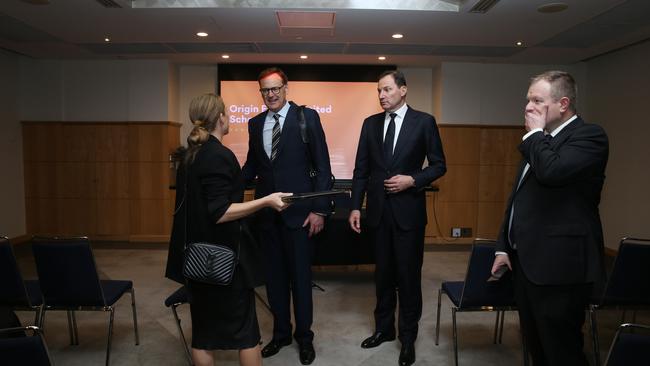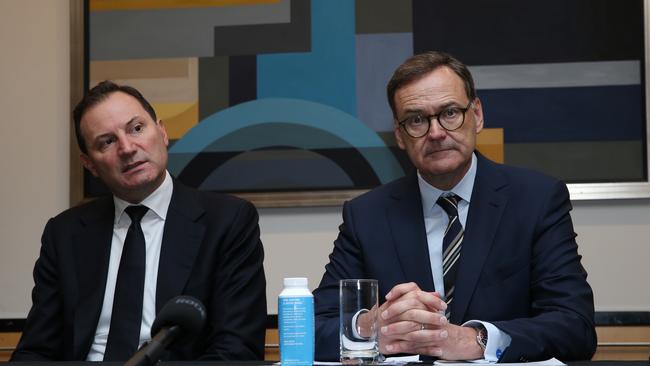
And left behind in the fight for Origin Energy is chairman Scott Perkins, who has been thoroughly played by a bevy of bankers after so strongly nailing himself to the Brookfield-led offer, only for that to be swapped out for a trickier, unfunded and highly uncertain Plan B that was lobbed at the last minute.
The fact is, the Brookfield-EIG proposal failed on its merits. More than 30 per cent of the proxy votes, including AusSuper’s 17.5 per cent stake, had landed on the side of rejecting the $9.53-a-share bid. At the same time, the proxy turnout on the vote was unusually low.

Under the scheme, Brookfield needed 75 per cent to get the prize but fell short on the day.
Origin’s board should recognise this: The scheme was defeated in its present form by the entire shareholder base and Perkins should send Brookfield and EIG packing.
Yet Perkins and his board are still bending over backwards to entertain Brookfield’s efforts to deliver an alternative proposal that has been packaged up as a double somersault with a pike.
Part of this is to delay the meeting for two weeks to give everyone time to sort out their position.
And the in the process, this has left Origin wide open to a messy legal challenge by agreeing to put a standstill on voting in the rescheduled meeting. This effectively freezes the share register in a moment in time – how it looked last Tuesday afternoon – and prevents anyone, including AusSuper or others, to keep the fight on the open market. Perkins says the path Origin is heading with a delayed vote forms part of the conditions of accepting the initial takeover scheme.
However, it smacks like a highly technical point that, from the outside, Origin didn’t have the stomach to challenge.
“I don’t think it’s a mess at all,” Perkins says of the delayed vote. “We’re just responding to our directors’ duties to assess new information.”
Brookfield and EIG had been busy cooking up their Plan B for about three weeks after key shareholder AusSuper made it known it intended to reject the sweetened share offer.
The sudden momentum away from the bid forced Brookfield to activate the plan on Wednesday night and secure the intended outcome of Origin delaying the vote.
But the switch has left a bad taste in the mouth of big investors who feel they didn’t have all the facts in front of them over recent weeks.
The plan itself is too smart by half. It is designed to bypass AusSuper’s 17.5 per cent holding and any other big fund determined to stand in the way of the buyout.
Instead the revised offer attempts to ram through a buyout as a shareholder proposal where Origin would sell its energy market jewels to Brookfield for $12.3bn, leaving Origin’s LNG rump on the listed market.
EIG has committed – although is not obliged – to pursue an off-market takeover of the LNG business. All up this messy process is pitched at a lower offer of $9.08. No wonder Origin’s board finally baulked at the new offer.
The recut smacks of desperation, and Origin’s board needs to be very careful about how the next few weeks unfold. Both Perkins and Origin chief executive Frank Calabria have agreed to pause their marketing of the takeover to investors ahead of a new vote scheduled for December 4.

There are many losers in this drawn-out affair and, worst of all, Origin is starting to get left behind in the renewable opportunity, and become badly distracted. Management have been trying to second guess who they have been working for, and their ability to dramatically ramp-up green investment plans has been constrained. It’s been 12 months to get to this point and Calabria conceded it was a “big time for the organisation” but insisted it hadn’t interfered with the day-to-day operations.
He said Origin was on track in its planning to deliver between 4 and 5 gigawatts of renewable energy into the market by the end of the decade. Investors too are increasingly second guessing what has been regarded as a well-run organisation with high standards of governance. Origin’s board’s handling of the saga has been sloppy amid its desperation to get the deal away.
And the big winner from all this is AusSuper and its chief investment officer, Mark Delaney, who for now is calling the shots at Origin with a less than 20 per cent slice of the company.
Indeed the battle for Origin has eerie parallels with last year’s battle for AGL where tech billionaire Mike Cannon-Brookes thwarted a split and secured overwhelming influence over the energy company for little more than 11 per cent.
At the same time Brookfield, a one-time partner of Cannon-Brookes, badly miscalculated the hunger for Australia’s biggest super funds to have a seat at the energy transition table.
Brookfield had its own management transition team meticulously planned and in place in recent weeks as it was preparing to take control of Origin.
AusSuper has shown it is prepared to play hard for what it sees as long-term value and will be prepared to fight against the new “low-ball” offer.
“AustralianSuper believes the ongoing energy transition has further enhanced the value of strategic energy transition platforms, such as Origin,” a spokesman for the fund says.
Key bidding partner the Washington-based EIG Partners says the offer – while likely to fall short of the super majority – still had overwhelming support.
“There’s a Plan B for a reason. The scheme (of arrangement) is the preferred route. It is still on foot and there’s going to be a vote on December and we’re focused on winning that vote,” EIG managing director Blair Thomas told The Australian.
“But in the scenario that it doesn’t happen and we still have the vast majority of shareholders onside, this is an alternative for them.”
The Bowen twist
Lobbing a bomb into the already volatile corporate drama was the intervention of Energy Minister Chris Bowen’s who outlined a massive expansion of the Capacity Investment Scheme from around 6GW to 32GW of renewables/batteries.
In effect, Brookfield argues this massively lowers the cost of capital for all renewable energy project, but in doing so undermines the competitive advantage that “gentailers” such as Origin or AGL with a large retail customer base to underwrite renewables demand.
AGL’s shares fell 2.9 per cent Thursday as the market digests the new policy. Origin shares were off 1.1 per cent. This will be another factor for investors to weigh up over long term value.
Origin’s Calabria noted size of the renewables program represents “a lot of energy supply and back-up coming into the market”.
“It’s certainly far more ambitious than anything we’ve seen before,” but quickly added there was a lot of detail needed to work through the design.
Analysts argue the scheme, which is still years off, also stands to remove the pricing volatility where players like Origin and AGL make their big profits.
The alternative offer turns a lot on “revised” because technically a new offer means it will be back to square one, starting the ACCC approvals process again. This would push back the deal for at least another six months, causing more distraction for Origin and its shareholders.
If the revised scheme offer doesn’t get backing from Origin’s board, Brookfield and EIG still remain determined in their move on Origin.
The nuclear option for both to walk away and wait six months under current rules and return with the lower, hostile bid.
This will only need 50.1 per cent support to get management control and in the process forcing AusSuper in a corner where it is stranded with a “stub” share holding in Origin and a much diminished voice.
the saga sees Brookfield behaving more like a Wall Street hedge fund, not the patient capital that it claims to be. This alone could force a rethink among some big investors when the Canadian giant comes calling again.
johnstone@theaustralian.com.au




AustralianSuper has emerged as kingmaker by outmanoeuvring Canadian giant Brookfield and its bidding partner, EIG, in the $20bn battle for control of the nation’s energy future.